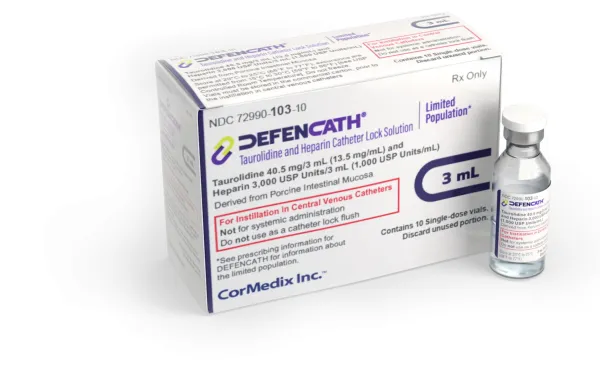DefenCath
Pronunciation: Deff-in-Kath
Generic name: taurolidine and heparin
Dosage form: single-dose vials
Drug class: Miscellaneous antibiotics
What is DefenCath?
DefenCath is a combination catheter lock solution (CLS) containing taurolidine and heparin that may be used to reduce the incidence of catheter-related bloodstream infections (CRBSI) in adult patients with kidney failure receiving chronic hemodialysis (HD) through a central venous catheter (CVC).
Taurolidine is a thiadiazinane antimicrobial that has a nonspecific way of working, causing damage to microbial cell walls and preventing microorganisms from adhering to biological surfaces. It has activity against common Gram-positive and Gram-negative organisms as well as fungi (see the prescribing information for a complete list of susceptible organisms).
Heparin is an anticoagulant, that reduces the formation of blood clots by enhancing the protease activity of Antithrombin III, a naturally occurring plasma protein, which inhibits activated coagulation factors involved in the clotting sequence, particularly Xa and IIa. Small amounts of heparin inhibit Factor Xa, and larger amounts inhibit thrombin (Factor IIa). It also prevents the formation of a stable fibrin clot by inhibiting the activation of the fibrin-stabilizing factor. Heparin does not have fibrinolytic activity; therefore, it will not lyse existing clots.
DefenCath is the first and currently only FDA-approved antimicrobial CLS in the U.S. and was shown to reduce the risk of CRBSIs by up to 71% in a Phase 3 clinical study. It was approved on November 15, 2023.
Warnings
Indicated for use in only a limited and specific population of patients (namely those with kidney failure receiving chronic HD through a CVC. The safety and effectiveness for other populations have not been established.
Do not use it as a catheter lock flush product.
Do not use in people with known heparin-induced thrombocytopenia (low platelet count), or a known hypersensitivity to taurolidine, heparin, the citrate excipient, or pork products. Hypersensitivity reactions to heparin have been reported at a rate of 0.5% in one trial. If a reaction occurs, discontinue and institute appropriate supportive measures.
Heparin-induced thrombocytopenia (HIT) was reported in one trial at an incidence rate of 0.3% in patients using heparin, a component of DefenCath as a CLS. If HIT occurs, your healthcare provider should discontinue the CLS and institute appropriate supportive measures.
Before taking
Tell your doctor if you have ever had:
- A hypersensitivity reaction to heparin, taurolidine, citrate excipients, or pork products
- Thrombocytopenia (low platelet levels).
You should not receive DefenCath if you do not have kidney failure and are not receiving hemodialysis through a CVC.
How is DefenCath administered?
DefenCath is administered by a healthcare provider and is only for instillation into central venous catheters.
- It is not intended for systemic (into the whole body) administration.
What are the side effects of DefenCath?
The most frequently reported side effects occurring in 2% or more people were:
- hemodialysis catheter malfunction
- hemorrhage/bleeding
- nausea
- vomiting
- dizziness
- musculoskeletal chest pain
- and thrombocytopenia.
To report suspected allergic reactions, contact CorMedix Inc. at 1-844-424-6345 or FDA at 1-800-FDA-1088 or www.fda.gov/medwatch.
Related/similar drugs
What other drugs will affect DefenCath?
No formal drug interaction studies have been conducted.
Ingredients
Active: taurolidine and heparin
Inactive: 26.1 mg/mL of citric acid, anhydrous (for pH control and to maintain the solubility of taurolidine). May include hydrochloric acid and/or sodium hydroxide for pH adjustment.
Available in sterile single-dose vials in the following strengths:
- 3 mL containing taurolidine 40.5 mg/3 mL (13.5 mg/mL), and heparin 3,000 USP Units/3 mL (1,000 USP Units/mL)
- 5 mL containing taurolidine 67.5 mg/5 mL (13.5 mg/mL), and heparin 5,000 USP Units/5 mL (1,000 USP Units/mL)
Storage
Stored in the original carton at a controlled room temperature of 20°C to 25°C (68°F to 77°F).
Excursions are permitted from 15°C to 30°C (59°F to 86°F).
Do not freeze.
Manufacturer
CorMedix Inc.
References
More about DefenCath (heparin catheter lock solution / taurolidine catheter lock solution)
- Compare alternatives
- Pricing & coupons
- Drug images
- Side effects
- Dosage information
- During pregnancy
- FDA approval history
- Drug class: miscellaneous antibiotics
Professional resources
Related treatment guides
Further information
Always consult your healthcare provider to ensure the information displayed on this page applies to your personal circumstances.

